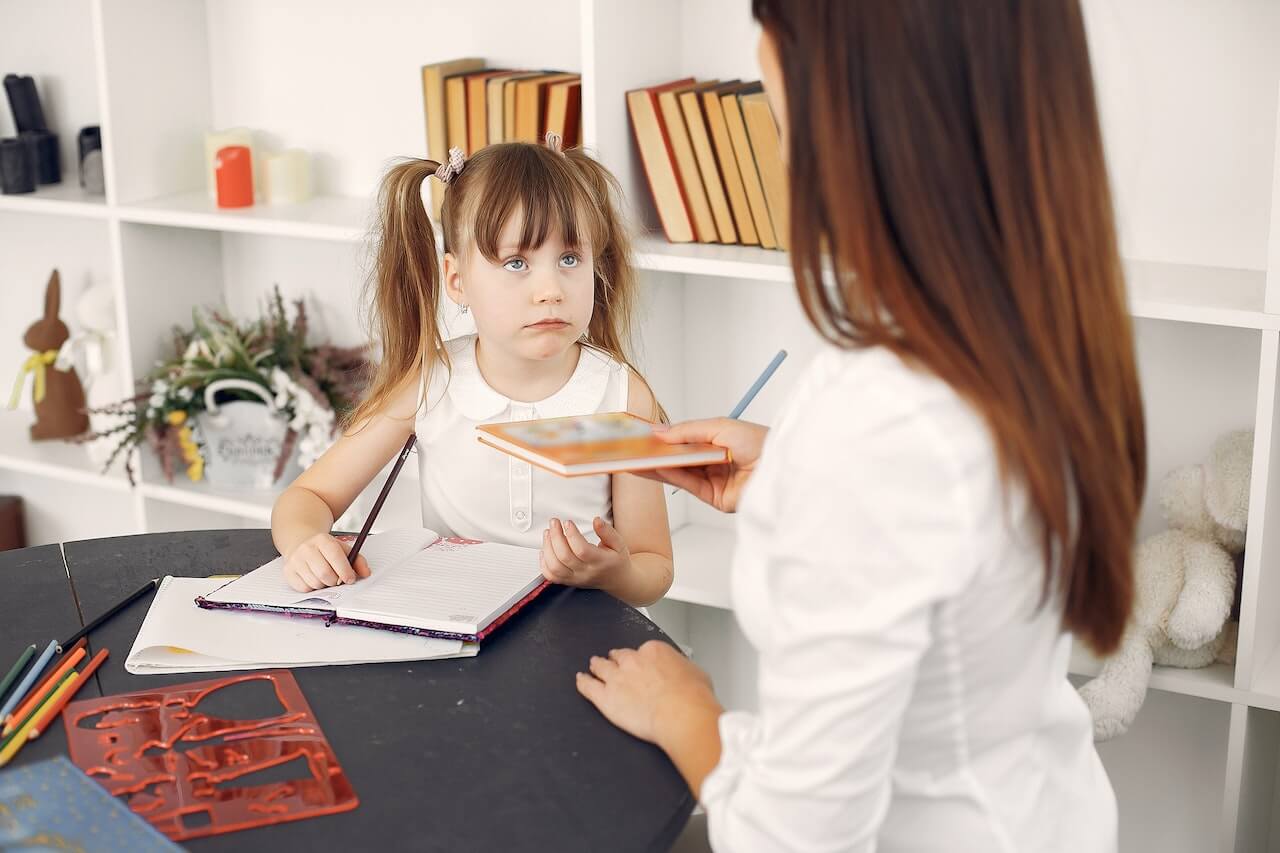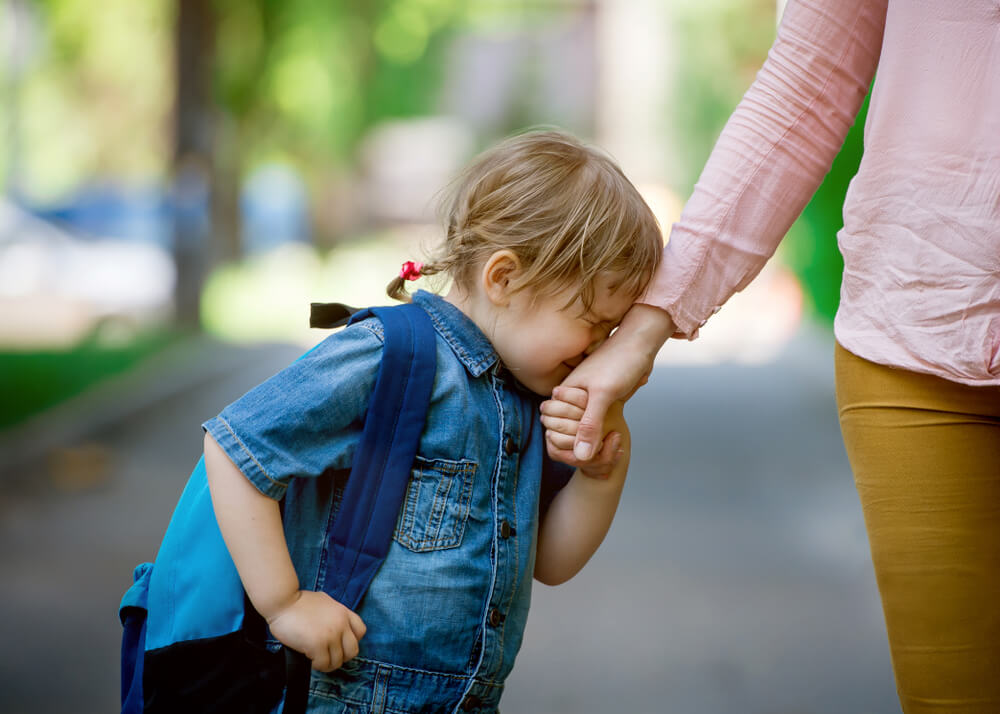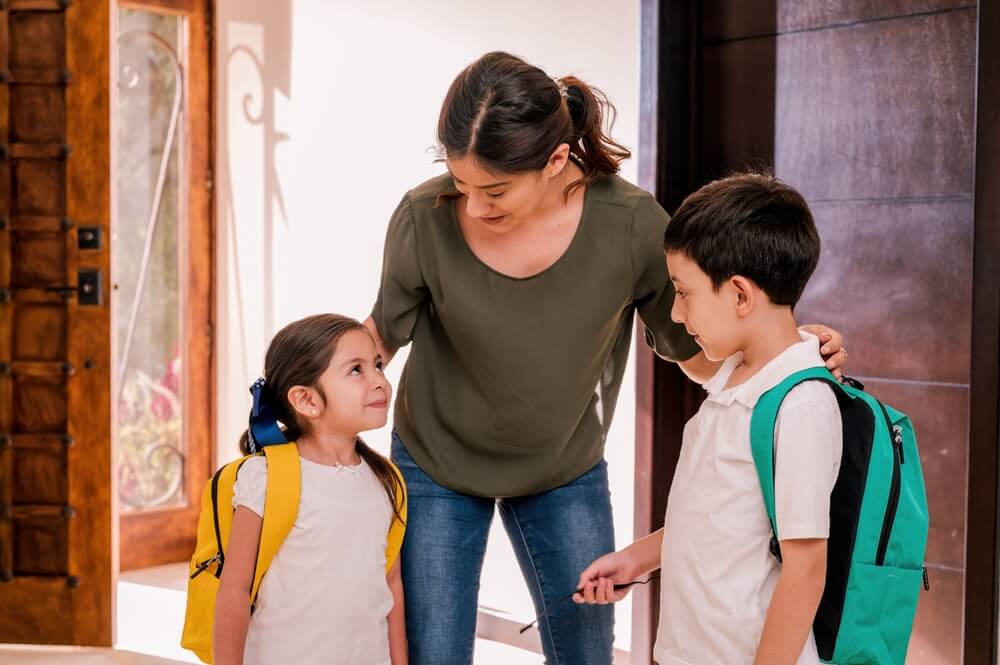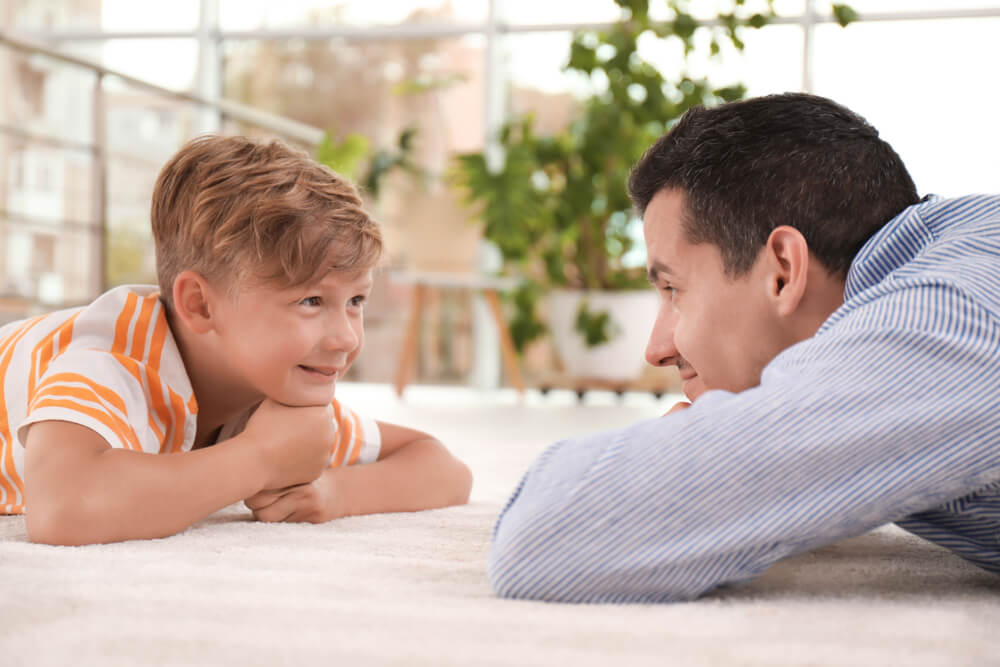Child Adjustment To School: How Long Does It Take and How To Help Your Kid

For many, the start of fall marks a period of significant change—the transition to a new stage: from preschool to elementary school or from elementary school to middle school.
As with many big changes in a child’s life, this shift brings its share of excitement, nerves, and sometimes challenges, not only for children but also for their parents. It’s a period of adaptation.
So, how can parents navigate this time with minimal impact on their children’s well-being and their own peace of mind? This article will hopefully offer some answers about child adjustment to school.
Contents:
- Adaptation Period: First Few Weeks
- Features of Adaptation of First Graders
- Features of the Adaptation of Fifth Graders
- Types of Adaptation
- Difficulties and Problems That Schoolers and Their Parents May Face
- Conditions for Successful Adaptation
- Resources For Parents
- FAQ
Adaptation Period: First Few Weeks

DGLimages/Shutterstock.com
What is “child adaptation to school”? In essence, adaptation is the process of becoming familiar with the new school environment, getting used to a structured learning routine, and adjusting to the unique conditions of the school.
According to psychologists, this adaptation period can last from 6-8 weeks to six months, sometimes more. The length of this process varies due to several factors, including the family environment, the personality of the child, the level of his or her knowledge and skills, the type of educational institution, the complexity of the curriculum, etc.
Stages of Adaptation to School Year

Gustavo Fring/pexels.com
The adaptation process is usually divided into three main stages, each has its own characteristics.
The Orientation phase
The child is facing new conditions, studying the situation, boundaries, norms, etc. That’s really hard for some children. That’s why the kid is often tense: both physically and psychologically.
Duration: Typically two to three weeks.
The Adjustment phase
The name speaks for itself: the child begins to adjust. They begin to find optimal behavior. Behavioral patterns are built in young kids’ heads, this allows the body to spend less energy than in the first stage. Reactions are already less emotionally colored.
Duration: about two to three weeks.
The Consolidation phase
At this stage, the children gain confidence in their new environment. This is a final assessment of the concept “I am a schoolboy, and what does it mean”
Duration: Five to six weeks to 1 year.
To facilitate your child’s adjustment to a new school and ensure their safety outside the home, we recommend using specialized apps such as Findmykids. This app allows you to track your child’s location, exchange messages, and even monitor their screen. Findmykids is a convenient and reliable way to take care of your child, enabling them to adapt to a new environment without worry.
Features of Adaptation of First Graders

Sharomka/Shutterstock.com
Adapting to school life and the school environment is a complex journey that helps young kids adjust to new conditions and a different status. A harmonious adaptation process often requires the guidance of an adult, who offers explanations, support, and comforting words. Parents should recognize that the adaptation process is temporary, and their active involvement plays a crucial role in determining the duration of adaptation and the child’s educational success.
In many respects, the adaptation of the child to school depends on the situation in the classroom. If a primary schooler feels comfortable, interested, and not scared—this facilitates the process of adaptation.
During this period, it’s crucial for the teacher to foster a friendly classroom environment. Children may experience increased anxiety, internal stress, and low self-esteem. Enabling each child to work in a mode that suits them is essential. The teacher’s calm and supportive approach, focused on recognizing children’s successes and achievements of children, can prevent nervous breakdowns. Monitoring the physical and mental health of a first grader is just as important.
If a parent suspects their child feels uncomfortable with adaptation, it is advisable to communicate with the teacher. Harmony and understanding between parents and the child’s teacher can significantly aid the adaptation process. In addition, don’t hesitate to seek additional help from specialists when necessary (psychologists, speech therapists, medical workers, etc.)
Features of the Adaptation of Fifth Graders

BalanceFormCreative/Shutterstock.com
The child’s transition from elementary to secondary school signifies a turning point, mainly because it coincides with the tumultuous changes of adolescence. As children evolve into teenagers, their personalities develop, and they seek independence, sometimes distancing themselves from the adults who once played a pivotal role in their lives. This is manifested in the fact that a teenager opposes any interference in his or her life and often goes against the feelings and desires of adults.
During this period, older kids begin to make new friends, shaping their social values through friendships. Self-esteem, previously linked to academic performance, now hinges largely on their interactions with peers. Communication becomes the primary activity during this phase.
Amidst these changes, educational motivation is often reduced, academic performance may decline and there may be conflicts with new teachers. Adolescents experience heightened mental activity, and their development is intricately tied to their emotional experiences during learning.
Success or failure in school significantly impacts their motivation. The ideal scenario is when their academic assessment aligns with their self-esteem and maintaining connections with old friends can help in this process. If this does not happen, there is an increase in internal discomfort, which over time can develop into an internal conflict.
In essence, the transition from elementary to secondary school not only brings external changes but also profound, internal ones.
Types of Adaptation

Pressmaster/Shutterstock.com
There are two main types of adaptation of the child to school.
Social and Psychological Adaptation
Entering first grade signifies a new status as a school student, accompanied by a reappraisal of values. Educational activities become paramount. The child falls into a new social group surrounded by unfamiliar faces. Both the teacher and the parent play an important role in cultivating a positive emotional attitude towards school.
During the adaptation period, it is vital to focus on the following skills:
- Cognitive abilities
For most kids, the development of cognitive abilities is a natural process. But this does not mean that you should not pay attention to the more successful development of this skill. In older preschool age, this skill develops in parallel with memory, attention, thinking, and cognitive interests. If all of these processes develop harmoniously, adaptation will take place faster.
- Creative thinking
Nowadays, it’s important not to think like “everyone else”. The attitude towards people with bright creative thinking is also changing. Parents should not be scared if their child knows how to “be creative” and think outside the box. This is a great skill for the future and in overcoming some critical situations.
- Self-organization
Starting school introduces structured schedules with lessons, breaks, and extracurricular activities, emphasizing the need for time management, a vital skill for first-graders. Additionally, developing logic, imagination, and social skills is important.
Physiological Adaptation
A huge physical load falls on the shoulders of a schoolchild: both mental and physical demands, with prolonged periods of static positions consuming the child’s energy. It is important not to miss the moment of fatigue.
And remember: each child is unique, and the time it takes for a child to adjust to school can vary.
Difficulties and Problems That Schoolers and Their Parents May Face

PeopleImages.com – Yuri A/Shutterstock.com
It is advisable for parents of future first-graders to know the main difficulties and problems that they may expect in primary school.
1. The problem of getting up in the morning
In the early days of school, waking tends to be without any difficulties. Over time, as the initial interest and excitement wears off and the routine begins, waking up can become a bit more difficult. Often in the morning right before school, the child experiences hysteria and separation anxiety—especially younger kids. One of the harmonious ways out of this problem is “gradual awakening”. This means that the child should not be woken up abruptly, but gradually, and gently, allowing them to rest in bed.
Sarah, a mother of a first-grader, noticed her daughter was struggling with waking in the morning. To begin with, she was so enthusiastic and loved getting all her things ready for school starts, but as the initial excitement waned she began waking later and later, making mornings increasingly stressful. Sarah decided to try the gradual awakening approach, which made a real difference to their mornings. She started by waking her up gradually, going into her room a bit earlier, and partially opening her blinds, allowing her to rest in bed for a short while. This simple adjustment transformed their mornings and eased the transition, making the household much calmer.
2. “Alex has it, so I want it too!”
New school-goers often communicate with peers while adapting to school life. There is a high probability that a kid can see another boy/girl with a beautiful backpack and a cool iPhone and desire the same.
Here the parents have a choice: provide these items to match their peers, or refrain, potentially leading to insecurity. An effective approach here is to encourage saving, promote financial responsibility, and let the child make the final decision: “Is it really necessary, or is it better to buy something else?”.
3. “Dangerous” Homework
Children should ideally complete homework on their own. It’s always tempting to step in and help your child but only do so when asked, ensuring a supportive presence. Supporting the child to a new level of responsibility is essential.
Independence does not mean abandonment but communicates trust and confidence in the child’s abilities. This is particularly important for building their self-reliance from the first day of school.
Read also: A Child’s Fear of School: Everything You Need to Know About Scolionophobia.
Conditions for Successful Adaptation

stockfour/Shutterstock.com
The most successful adaptation conditions include:
- The presence of a complete family.
- A high level of parents’ education.
- Adequate methods of education.
- Respect for the rights of the child.
- The child’s readiness for school.
- A positive attitude in the family to the status of a schooler.
- A well-structured school day.
Successful adaptation to school life is best achieved through a combination of factors. While each child’s journey is unique, it can be helpful to look at other experiences to learn more about what contributes to success.
The Waltons, a busy working family, found that creating a structured daily routine made a significant difference in their children’s school adaptation. They prioritized a consistent sleep schedule, set up a dedicated homework area, and allocated time for outdoor activities.
They noticed that by maintaining a positive and organized home environment, their children were confident and independent. For a busy family, this approach was a game changer—showing that amidst the hectic lifestyle, creating a supportive routine can make a real impact.
Signs of Successful Adaptation

wavebreakmedia/Shutterstock.com
- Satisfaction with the learning process. The child is happy to talk about the school and is happy to attend it. Kids excited about the learning process is a clear sign of success.
- Mastering the program. The child manages tasks without significant difficulty. If difficulties arise, it’s essential to provide support without comparing it with other children, reprimanding, or pointing out shortcomings.
- The degree of independence. The child should ideally complete tasks independently, seeking adult help only after unsuccessful attempts. Avoid starting assistance from the outset, as the child quickly gets used to this option and so it can hinder future self-reliance.
- Satisfaction with a teacher and classmates. Harmonious interactions with the teacher and classmates are key. When the child has a positive rapport with them, the adaptation process tends to be smoother.
General Recommendations for Parents—Advice From a Psychologist

SALMONNEGRO-STOCK/Shutterstock.com
Praise
Each mother, helping to do homework for her child, notices mistakes. But she just wants the child to write and complete all the tasks correctly! At this moment, the mother’s inner critic, solely out of love for the child, begins to find fault, pointing out errors…
It is important for the parent to notice what the child is doing well, and to focus on this. This will give confidence and the student will have a desire to do better!
The schedule for the preparation of homework
To ensure the best homework approach, parents should observe their child and answer a few questions:
- How easily does your child get started on tasks?
- What’s their endurance before getting tired?
- How quickly do they become fatigued?
For children finding homework challenging, it is best to start with literary reading. Those who tire quickly should incorporate breaks during mathematics.
Don’t demand too much!
Understanding your child’s capabilities is vital. To do this, you can simply observe what they excel at and where they may struggle, then gently set goals slightly above their abilities.
Confidence betting

New Africa/Shutterstock.com
Parents should identify their child’s strengths by asking questions:
- What delights me in my child?
- What can he or she do well?
Helping your child become a confident student, rely on what he or she is good at.
There should always be an opportunity to calm down
Parents often struggle with comforting their children during times of sadness, disappointment, and tears. It is crucial to acknowledge the child’s feelings and allow them to express themselves.
Avoid dismissive phrases like “don’t worry about it” or “it doesn’t matter”. Instead, show you understand by saying “I know you’re upset”, and gently encourage them to share their feelings.
In addition, consider these recommendations:
- Remember the feeling of being a beginner.
- Teach them to keep all things in order.
- Remember the child also has the right to make a mistake.
- Give your children the opportunity to do it themselves.
Install the Findmykids app right now! This way, you can help children adapt successfully and provide them with freedom while knowing they’re safe.
Medical Recommendations

Africa Studio/Shutterstock.com
- Stable daily routine. It is important to bring the child to this regime not immediately, but gradually.
- Good sleep.
- Healthy breakfast.
- Convenient workplace. It is important to choose the right furniture (appropriate for the growth of the child) and place the light on the left of the child.
- Walking in the fresh air (at least two hours a day).
- Rest after school (preferably with a change of activity).
- Rationally healthy diet.
- A positive attitude towards people around.
- The desire for success.
- Exclude watching TV and computer games before going to bed.
Summing up, it should be said that adaptation to school is a serious way, having passed which the child rises to a new stage of development. If he or she is accompanied by well-coordinated working parents, a teacher, a psychologist, and a medical worker, this path will not be too long and thorny.
Resources For Parents

Yuganov Konstantin/Shutterstock.com
Understanding how a child adjusts to school is vital for parents who want to help children make a smooth transition into this new phase of their lives. For further support, the following resources may help:
- https://www.familylives.org.uk/advice/primary/learning-school/starting-primary-school
- https://www.youngminds.org.uk/professional/resources/supporting-school-transitions/
- https://kidshealth.org/en/parents/back-school.html
- https://www.cdc.gov/childrensmentalhealth/features/COVID-19-helping-children-transition-back-to-school.html
- https://www.startearly.org/resources-families/back-to-school-resources/
- https://childmind.org/article/back-school-anxiety/
Additionally, you can seek help and guidance from your child’s school counselor.
In the grand scheme of a child’s life, the adjustment to school is a pivotal moment, one that can shape their future experiences and attitudes toward learning. Whether your young child is just embarking on their educational journey, navigating new school assignments, and obtaining school supplies, or if you’re helping an older child cope with the changes that changing schools affect, remember that the transition may require some time.
Understanding that each child’s adaptation to their school environment is unique is crucial. School events, school districts, and interactions with other kids all play their part in this process. As parents and guardians, our role is to provide the support, encouragement, and guidance needed during this period.
Remember, every child has their own pace in acclimating to the academic world. Stay engaged, communicate openly, and ensure that your child feels heard and supported throughout their school adventures. By addressing their individual needs, you’ll contribute to their positive adjustment to school, setting them on a path to educational success.
FAQ

Africa Studio/Shutterstock.com
How long does it take to get used to school?
It varies, but typically it takes 6-8 weeks for children to adjust to their new environment. However, it might take as long as 6 months for some—or possibly longer—depending on the individual circumstances and influencing factors.
What does adjustment to school mean?
Adjusting to school means that a child is becoming familiar with the school environment, the new routines, and expectations. It refers to the period during which a child develops a sense of comfort and confidence in this new setting.
How do I adjust to back to school?
Adjusting back to school is usually a quicker process as there is already familiarity and understanding of the environment and expectations. So really the best thing is to keep to a consistent routine, make an effort to engage with other children, and communicate openly with parents and teachers.
How long does it take for a child to adjust to a new school?
Just as the time to adjust to starting school varies, so too does the adjustment to a new school. It often takes a few weeks to a few months. Personality, the school’s atmosphere, and the complexity of the curriculum are all factors that can influence the adjustment period.
The picture on the front page: LightField Studios/Shutterstock.com
Проверьте электронный ящик



















